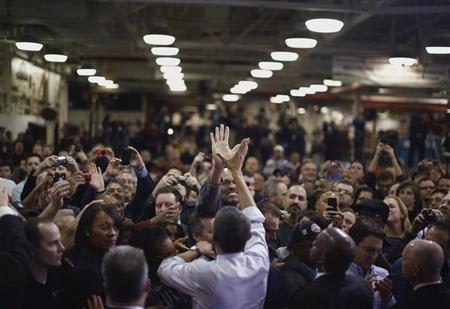
WASHINGTON (Reuters) - President Barack Obama will propose a "grand bargain for middle-class jobs" on Tuesday that would cut the U.S. corporate tax rate and use billions of dollars in revenues generated by a business tax overhaul to fund projects aimed at creating jobs.
His goal, to be outlined in a speech at an Amazon.com Inc facility in Chattanooga, Tennessee, is to break through congressional gridlock by trying to find a formula that satisfies both Republicans and Democrats.
Efforts to reach a bipartisan "grand bargain" on deficit reduction have been at an impasse for months.
Senior administration officials said Obama is not giving up on a big deficit-cutting package, but given that no agreement appears on the horizon, he is offering a new idea to try to follow through on his 2012 campaign promises to help the middle class.
"As part of his efforts to focus Washington on the middle class, today in Tennessee the president will call on Washington to work on a grand bargain focused on middle-class jobs by pairing reform of the business tax code with a significant investment in middle-class jobs," said Obama's senior adviser Dan Pfeiffer.
A spokesman for John Boehner, the Republican speaker of the House of Representatives, criticized the idea even before the release of the plan's details, saying it further backs Obama's policies on taxes and spending "while leaving small businesses and American families behind."
Obama wants to cut the corporate tax rate of 35 percent down to 28 percent and give manufacturers a preferred rate of 25 percent. He also wants a minimum tax on foreign earnings as a tool against corporate tax evasion and increased use of tax havens.
The new twist is that in exchange for his support for a corporate tax reduction, he wants money generated by the tax overhaul to be used on a mix of proposals such as funding infrastructure projects like repairing roads and bridges, improving education at community colleges, and promoting manufacturing, senior administration officials said.
Obama's proposal would generate a one-time source of revenue, for example, by reforming depreciation or putting a fee on accumulated foreign earnings.
Officials gave no specific figure on how much money would be raised, but Obama called for $50 billion for infrastructure spending in his State of the Union speech in February.
The White House hopes the idea will gain some traction in Congress because Republicans want corporate tax reform and Democrats want spending for infrastructure, so this offers something for both sides.
Administration officials said they recognize, however, that the climate is difficult in Congress with Republicans adamantly refusing anything that is seen as increasing spending and Democrats in no mood to cut taxes and get nothing for it.
Bob Corker, a Republican from Tennessee on the Senate Banking Committee, sounded a skeptical note, but said he has yet to see the proposal's details.
"It would have to be a massive deal, I think, for any kind of Republican to look at revenues as part of this," Corker said on MSNBC. He said it would have to include "transformative structural changes" for programs such as Medicare for the elderly and the Social Security retirement system.
Obama's speech in Chattanooga is the latest in a series of speeches aimed at making good on his promises to boost the U.S. economy in ways that help the middle class. He is looking to breathe new life into his second term, which has so far found successes to be fleeting.


